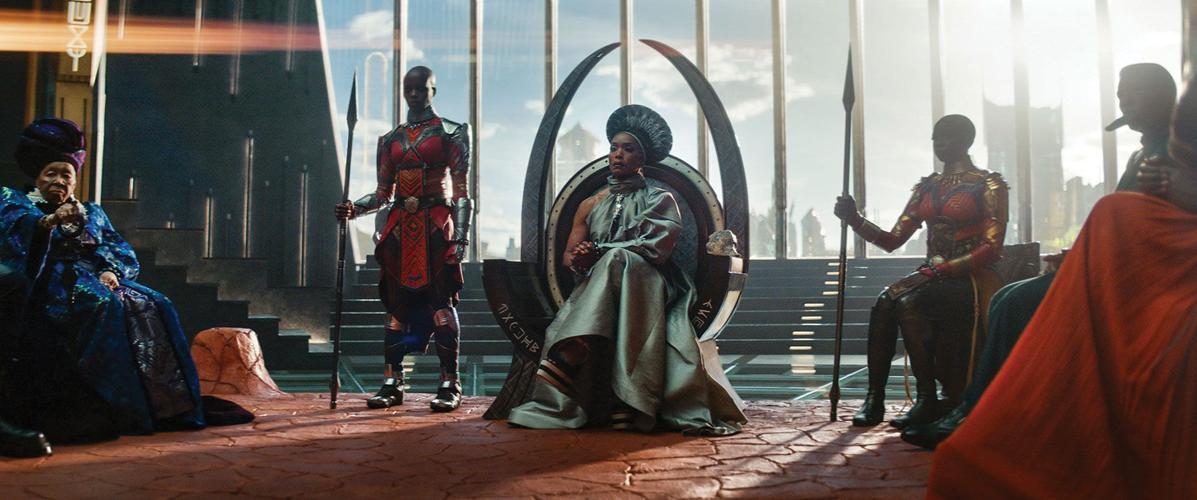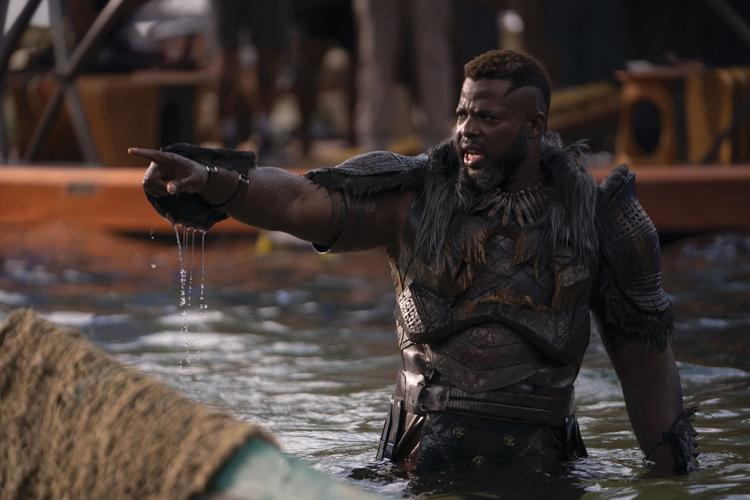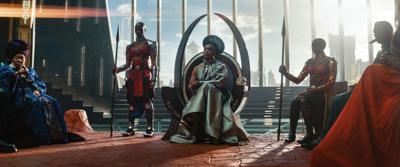A film dealing with unexpected circumstances demands an unexpected review. Black Panther: Wakanda Forever would be a major cultural event even without the tragic loss of Chadwick Boseman to cancer, inviting multiple perspectives to get at its many intersections. But after the loss of Boseman, the ongoing COVID-19 pandemic, frantic rewrites and the scattershot insanities of modern exhibition, there’s a lot to get at with this film. Following the unpublished back-and-forth discussion following Lizzo’s show at Bridgestone, we — Scene film critic Jason Shawhan and artist (check her out on Instagram at @sheronicamars), cinephile and Belcourt front-of-house manager Sheronica Hayes — decided to start this dialogue in a public space.
Jason Shawhan: I can’t think of any previous instance of filmmakers having to deal with these kinds of circumstances before having to make something on this scale. It’s amazing how focused on the emotional processes of these characters the film is. There was some of this in last year’s Eternals, but nothing to the extent that BPWF makes the viewer feel. The global audience becomes the nation of Wakanda, working through this absence at the heart of this experience.
Sheronica Hayes: For sure. I think the closest thing would probably be Heath Ledger and The Dark Knight, but for so many reasons I’m sure continuing this story was tremendously more difficult without Chadwick. There’s no escaping the mourning in Wakanda Forever; it’s embedded in the story. It’s visible in the eyes of every returning character. I think it’s beautiful how straightforwardly they allow the characters and the audience to grieve the death of Chadwick and T’Challa collectively. It would have been a huge disservice all around if they had tried to take a softer way out.
JS: I love the way they use the opening Marvel logo to pay tribute to them, but they do it quietly. It’s such a sensory fake-out, and it sets you up for things not unfolding exactly as you might expect.
SH: Absolutely! And this definitely ties into what I was saying about how this movie handles grief. It doesn’t shy away from the heaviness. It places it right in the palm of your hand. It’s interesting that you use the word “quietly” here, because the scene is literally silent. Why do you think they made that creative choice?
JS: The usual Marvel logo music is amped-up, and it’s meant to put you in the excited moviespace. This is something very different — Wakanda has its rituals of grief, but mainstream Hollywood blockbusters have never really done something like this, where they try to make an emotional locus work as something both in-universe and in the real world. Honestly, I wish Disney would have done something like this for Carrie Fisher, truthfully. I also wish they’d strike a nice 4K DCP of Waiting to Exhale, while we’re on the subject of things they need to be doing. And speaking of that game-changing moment in iconicity, there’s that moment, when after having to handle so much global business, we see Angela Bassett’s Queen Ramonda back in her own space in Wakanda, and she’s doffed her headdress/fascinator, and we see that she has this steely white Dionne Warwick/Nichelle Nichols hair, and it’s such a disarming emotional touch.
SH: It’s such a powerful and confusing moment. We really see how vulnerable she is here. The “strong Black woman” trope often dismisses the emotional gradient that exists in Black women. Queen Ramonda has now buried a husband and a child. Time has a way of making us all gray, and yet it’s still very taboo to see women of any age with natural gray hair on screen.
JS: And she is Angela Bassett, the undying, the unbroken. On the ride home, I had my phone working to find the 1993 Remix of “I Might Have Been Queen” by Tina Turner, because that is such a touchstone for the sheer iconic space that she occupies. She really is everything.
SH: We’re allowed to see her as a woman who is aging, but also a woman who simultaneously has so much fight left in her. This duality is an important one to represent. Also, that gray fro just looks so badass. I’ve never seen a hairstyle that so visibly announces, “I am wise and loving, but I will put my foot up the ass of anybody who comes for my family or my home.”
JS: It’s not too much of a bold statement to say that Namor can get it, right? Tenoch Huerta Mejía has an “introducing” credit here, but he’s been in heaps of stuff. Discovering he was the crime boss in Issa Lopez’s Tigers Are Not Afraid kind of kicked my ass.

SH: He is so capital-F Fine. He talks the way I imagine the serpent who seduced Eve in that garden talks. He could tell me to do just about anything, and I would gladly oblige. And of course, we see this happen in the movie. The mythology of the siren is evident in the development of the Tlalokan people. I’m genuinely enthused to visit some of Huerta’s prior works, and I’m looking forward to seeing him star in other things. Spending just a few moments exploring his world in BPWF, I wouldn’t turn my nose up at a Namor full-length feature. Let’s be real though — the ankles aren’t the most convenient place to have wings.
JS: I love the way Namor bounds through the sky. It reminds me of Channing Tatum’s rocket-skates in Jupiter Ascending, or those battles across the sky in Immortals. And also, I love that Shuri’s casualwear choices are equal parts ’80s Miles Davis and Lil Nas X.
SH: [Laughs] You can tell that they’re really trying to make Shuri gay without making Shuri gay, y’know? This isn’t to suggest that the actress, Letitia Wright, is queer, but it definitely feels like there’s room to interpret the character of Shuri as queer, and I’m here for it. It feels way more natural to her personality to see her look like she could be in an early-2000s Missy Elliott video versus the more feminine wardrobe she rocks in the first movie. We all know that Hollywood can often force masculine identities onto Black women, especially those with African features as opposed to European features, but in the case of Shuri, it honestly just feels organic to see some tomboy playfulness in her haircut and wardrobe in Wakanda Forever.
JS: It absolutely could be that, by trying to make Shuri not come off as too girly, they’ve given her pansexy vibes. I guarantee you’re going to see her outfits at Click and Drag/Cyberfetish nights — she consistently gives William Gibson jumpsuit realness.
SH: I have a feeling in 2023 we’re going to see hella cosplays and Halloween costumes inspired by this movie. Those Midnight Angel bodysuits?! Immaculate. Speaking of Shuri, let’s address the elephant in the ancestral plane — the figurative one. Is it just me or is the chemistry between Leticia Wright and anyone she’s on screen with just … off? Is this just the juju you get when you’re an alleged anti-vaxxer on the set of the biggest movie of the year?
JS: [Laughs] You said it. But you’re also not incorrect. I really want to give a super shoutout to Michaela Coel. When I heard she was going to be in this film, I was all swirly with the possibilities, and her character Aneka is an interesting addition, giving us a little bit of a feel for how the Dora Milaje operates internally. I’ve said it before, but I really want to see Grace Jones pop up in some capacity when we’re talking about the Dora Milaje. But I’m in awe of Coel in this film, because there is so much talent, and so many kickass Black women, and she finds her own place and brings new facets to the story. Also, in a film with this many impeccable cheekbones, she wins.
SH: The category is cheeks when it comes to the Dora Milaje, and Michaela Coel snatches the trophy. Aneka really helps introduce the interpersonal dichotomy of the Dora Milaje, which we just really don’t get in the first movie. It’s so damn refreshing to see them as not only soldiers and sisters, but also friends.
JS: And occasionally lovers, in a scene that will doubtless be excised in several territories throughout the world.
SH: It reinforces their loyalty to one another. It adds humanity to their patriotism, which helps us distinguish those who do things for the sake of duty from those who do things for the sake of love. The latter being far more honorable.
JS: Truth.
SH: Coel has proven time and time again that she is capable of any and damn-near everything. There are few people on this planet who could rival the fierceness of Grace Jones, and I think Coel is up to the task. I’m not sure the ordinary person could handle the two of them on one screen honestly. Are we even worthy?







